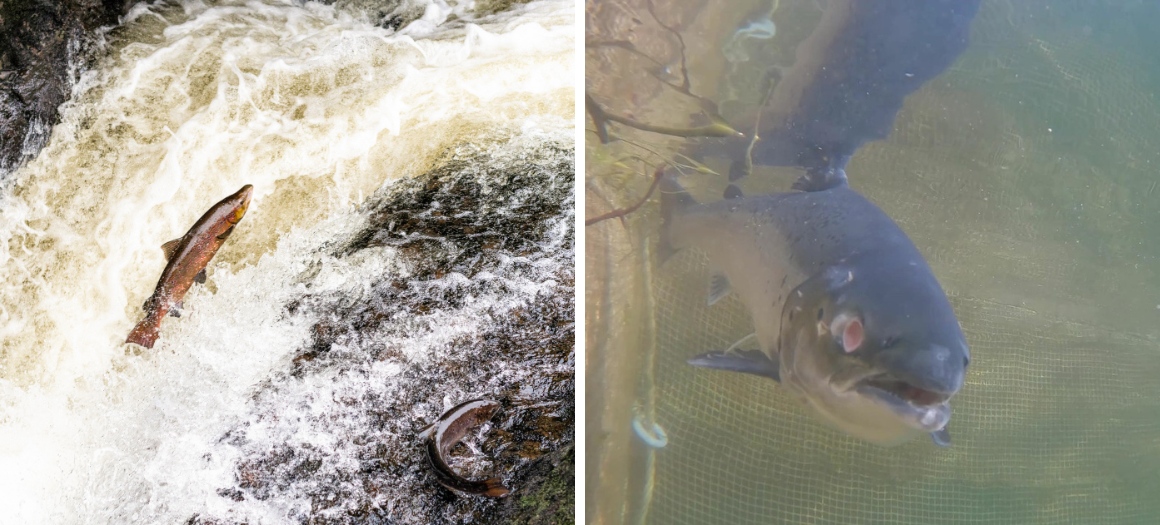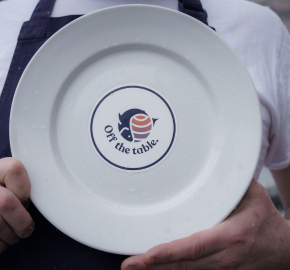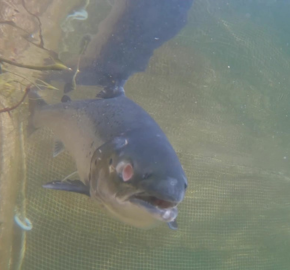Chefs decry industry greenwashing as WildFish launches appeal to stop the removal of “farmed” from “Scottish farmed salmon” protected name

WildFish has issued a formal appeal in the General Regulatory Chamber of the Tribunal against the UK Secretary of State for Food, the Environment and Rural Affairs’ approval of an application made by Salmon Scotland for a change in its Protected Geographical Indication (PGI) name.
WildFish will argue that the change in the PGI name, from “Scottish farmed salmon” to simply “Scottish salmon”, which was approved on 3 April 2024, is likely to mislead consumers and does not meet the legal obligations of assimilated EU Regulation 1151/2012 on quality schemes for agricultural products and foodstuffs.
Rachel Mulrenan, Scotland Director for WildFish, said: “This is a continuation of an attempt to greenwash the reputation of Scottish farmed salmon in the eyes of consumers. With rising numbers of dead fish on the farms, toxic chemicals polluting Scottish sea lochs, and concerns about fish welfare, it’s perhaps no surprise that this application has been made to change the name and drop the word “farmed”. But let’s be clear – this is farmed salmon raised in Scotland, it is not Scottish salmon.”
PGI labels are used in the EU and wider export market to communicate to consumers the authenticity of products known for the region in which they are made, such as Cornish pasties, Melton Mowbray pork pies and Stornoway black pudding. “Scottish farmed salmon” was first registered as a PGI in 2004.
The application for the amendment to the PGI name was made in July 2023 by Salmon Scotland, the trade body for the salmon farming industry in Scotland. Several individuals and organisations submitted objections to the application, including chef Tim Maddams, formerly of River Cottage, Clare Mercer Nairne of The Meikleour Arms in Perthshire, food systems NGO Feedback, the Scottish Coastal Communities Network and Animal Equality.
Chef, Tim Maddams said: “It’s tiring and frustrating to have not managed to halt this small advance in the ever-growing marketing power of salmon farmed in Scotland but it’s totemic of a broader issue – the continued greenwashing and subtle ‘not quite sleight of hand’ of large scale agribusiness in general. If we can’t stop the greenwashing, where will it end?
Be it farmed salmon that are fed on wild-caught fish and reared in low welfare lots that pollute these beautiful remote places, or the vast array of not-quite-commitments to welfare standards (“outdoor bread, freedom food, outdoor reared”) of land-based agriculture, this decision is one more nail in the coffin for ‘Scotlands wild salmon and sea trout and another opportunity for profit from this disappointing industry”.
Jessica Sinclair Taylor, Director of Campaigns on Diets, Retail and Food Environments at Feedback, said: “This decision makes a mockery of the purpose of geographical indication labels, by allowing an industry which is fundamentally extractive to continue to damage the geography on which it has built its reputation. Farming salmon has serious consequences for wild fish populations which are caught to feed farmed salmon, and global access to good nutrition. Instead of enabling the industrialised salmon farming industry to obscure its methods, the government should be promoting the many health benefits of eating locally-caught pelagic fish like sardines and herring.”
There is no way that referring to this intensively-farmed product as “Scottish salmon” instead of “Scottish farmed salmon” gives consumers more information on how that fish was brought to supermarket shelves and restaurant plates.
Rachel Mulrenan
Scotland Director for WildFish
Ms Mulrenan continued: “As sustainability issues become increasingly important, this is a thinly disguised attempt by the Scottish salmon farming industry to pull the wool over consumers’ eyes, both in the UK and further afield. More than ever, people need to know the true origin of the products they are buying and consuming, so that they can make informed decisions. This name change is a step in the wrong direction.”
Concerns have long been raised about the negative environmental, welfare and sustainability impacts of Scotland’s salmon farming industry, including:
- The negative impact of parasites and escaped fish from Scottish salmon farms on wild salmon
- High mortality rates on the farms
- Pollution of the sea by toxic chemicals used by the industry
- Unsustainable use of other fish species as parasite ‘cleaner fish’
- Use of fish from unsustainable wild-caught fisheries to feed farmed salmon
- Use of antibiotics on Scottish salmon farms
- Significant carbon footprint of Scottish salmon farming
In October last year, WildFish and Coastal Communities Network submitted a complaint to the Competition & Markets Authority (CMA) in relation to sustainability claims made by Salmon Scotland.
There is a growing call across the UK and internationally for the hospitality and retail sector to move away from open-net farmed salmon on account of these issues. More than 200 chefs and restaurants, as well as 60 community groups, charities and NGOs, are supporting WildFish’s Off the table campaign, which asks chefs and restaurants to take farmed salmon off their menus.




They may both be called Salmon but the taste of wild salmon is far superior.
Farmed Salmon is often fat and a completly different taste.
Farmed Salmon are causing damage to the loch/sea beds with their “SH one T” and vast increase of sea lice ( not good for farmed Salmon to be eaten alive by lice).
Can the fish farms even claim that their fish are indeed “Scottish”? I understand that most of the eggs or young fry come from Norway therefore making them “Norwegian” Farmed Salmon raised in Scotland???
Another point why is it that the RSPCA can confirm fish farms quality? The RSPCA has No jurisdiction in Scotland it being the SSPCA here in Scotland.
Yet another point – Is it not about time that we inform the general public about farmed salmon and not keep preaching to the already converted???
No way should Scottish or any farmed fish be passed off as Scottish Salmon ( or other geographical farmed fish.
It is well past the time that the Scottish and other Governments put a halt to the pollution and disease that the farmed fish industry constantly get away with.
I would have thought that such a clearly cynical and deceptive marketing tactic to deliberately hide the true identity and nature of Scottish ‘farmed’ salmon by removing the word ‘farmed’ contravenes the 1968 trade descriptions act in an attempt to dupe the consumer. Ultimately the demise of the Scottish salmon farming industry will be consumer driven – remove the market for the product, but also find an alternative source of income for the Scottish economy. I’m sure many of us will remember the demise of the crayfish market in the 1970s and the subsequent detrimental ecological impact of American signal crayfish.
All anglers have a golden opportunity coming up with the next general election in Scotland . Make all MPs from every party aware that they must stop this industry or force change. If the current SNP government don’t guarantee this them it is every anglers duty to vote them out. Salmon farming is I believe Scotland’s second tax earning industry behind whisky. It does employ a lot of people. So did coal mining, so did the steel industry. When these industries were shut down, job losses or not, it was done. It was also seen as “green”, stopping pollution, etc . Salmon farming should be MADE a major issue at the election and every would be politician should be made to make their loyalty to Scottish nature or Norwegian profits known. They also should not be allowed to hide behind any “ongoing investigation or report”.
Over and above the well known and well documented harm that the farming of salmon is doing to the wild stocks this is a flagrant breach of trade descriptions act and potentially also the Sale of goods act. There is a clear distinction between wild salmon and “farmed”salmon”. The approval of this is yet another demonstration of how far removed our regulators are from the realities facing wild salmon populations. This move disguises what is truly going on . The merit ofALL SALMON SOLD IN SCOTLAND IS FUNDAMENTALLY BASED ON THE QUALITY OF THE WILD FISH.The current the wipe out of wild stocks ultimately will undermine the very selling point this industry is attempting to capitalise upon! Fully support your efforts to get this reversed!